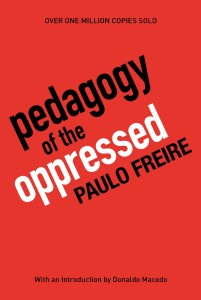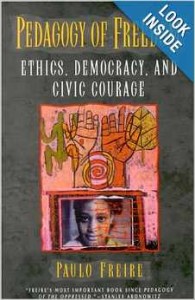
Critical Solutions for Five Billion Poor Including US Poor
January 7, 2008
Paulo Freire
Over a year ago 24 of us decided to co-found the Earth Intelligence Network and begin producing public intelligence in the public interest. We quickly expanded the vision to include a Transpartisan Policy Institute and a Public Budget Office. Today, for free, any citizen can get a weekly report on “GLOBAL CHALLENGES: The Week in Review.” Our free report is superior in multiple ways to the President's Daily Brief, which costs the taxpayer $1.2 billion per WEEK ($60 billion for secret intelligence, pro rated over 52 weeks).
Early on we realized that educating the five billion poor was both a non-negotiable first step, and “mission impossible” if we accepted the standard educational system that is part prison, part child care and part didactic dildo display (my lesson outline is bigger than yours).
Before I read this book, we had conceptualized a concept for educating the five billion poor “one cell call at a time,” leveraging free cell phones and 100 million volunteers covering 183 languages, each using Telelanguage and Skype to be available on demand.
Now, with this book, and also Pedagogy of Freedom: Ethics, Democracy, and Civic Courage (Critical Perspectives Series), I feel we have struck the mother lode.
A few notes and then some other links.
+ Stark critique of the “banking” system of education that deposits knowledge without teaching critical thinking or how to create new knowledge.
+ Relevant to US, not just Third World.
+ It's about class, not race. Concentration of wealth above, poverty below.
+ The author illuminates for all of us “the humanizing voaction of the individual” and the “power of thought to negate accepted limits.”
+ Modern education instills a culture of silence and lethargy. Friere's work instead inspires liberation, dignity, and the ability to change.
+ Illiterates are not stupid, they just cannot read. They *can* be empowered, taught, and energized orally.
+ Education is NOT neutral–it is either teaching for the benefit of the oppressors (producing docile factory workers) or for the benefit of the opprssed (liberating, empowering with individual volition).
+ Dehumanization is a historical reality.
+ False charity perpetuates dependenct.
+ Recognition of reality liberates BOTH the oppressed and the oppressor.
+ Oppressed must break free from “having is being” and learn that “being is enough.”
+ The oppressed cannot be “granted” freedom, it must result from an interactive dialog that liberates both sides
+ Liberation and revolution or transformation for the good of all are essentially pedagogical missions with very high ethical content.
+ Humanizing pedagogy is the anti-thesis of propaganda, manipulation, and deceit.
+ “Co-intentional” education
+ Authentic thinking can only be realized in communication with another
+ Pyramical (one-way) education enslaves, circular (multi-way)education liberates
+ Any educational system that does not respect nor elicit the student's own worldview is culturally invasive
+ Education of the five billion poor must begin by LISTENING to them.
+ “Libertarian education” STARTS with the needs and views of those to be educated.
+ Communion and communication leads to cooperation and cultural synthesis.
A few links:
The Fortune at the Bottom of the Pyramid: Eradicating Poverty Through Profits (Wharton School Publishing Paperbacks)
The Wealth of Networks: How Social Production Transforms Markets and Freedom
The Tao of Democracy: Using Co-Intelligence to Create a World That Works for All
A Power Governments Cannot Suppress
Society's Breakthrough!: Releasing Essential Wisdom and Virtue in All the People
One from Many: VISA and the Rise of Chaordic Organization
The Battle for the Soul of Capitalism


